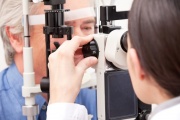Contents |
Eyecare Practitioners: Who Does What?
Introduction
There are three types of professionals who provide an outstanding level of patient care in Canada and the US: Optometrists, Ophthalmologists and Opticians. Often, people are confused as to which professional they should seek out when they need ocular or vision eyecare. Making the confusion worse is the fact that there is some overlap between the three.
Ocular care and vision services are provided by eyecare practitioners known informally as the three “O” professions: Optometrists, Ophthalmologists and Opticians.
We hope to clear up some of the confusion here.
Optometrists
Doctors of optometry are independent, primary health care providers, specializing in the examination, diagnosis, treatment, management and prevention of diseases and disorders of the visual system, the eye and associated structures as well as the diagnosis of other systemic conditions that can often affect the eyes.
In Canada and the US, optometrists prescribe corrective eyewear that includes spectacles, contact lenses and low vision aids; in addition to diagnosing refractive errors, optometrists also do testing for binocular vision disorders like strabismus and amblyopia and provide vision therapy.
In most provinces of Canada and throughout the US, optometrists use diagnostic pharmaceuticals (like drops that dilate the pupils) as well as topical and systemic medications for the treatment of eye diseases (like glaucoma). In addition, an optometrist can help in the management of the ocular effects of other, systemic diseases (such as diabetes).
Optometrists must have an undergraduate degree (usually in one of the sciences) and four years of postgraduate training to earn their Optometric Doctorate, or O.D.
In addition, many optometry college graduates are now choosing to do a residency in one of several specialties such as eye disease or contact lenses, among others.
Before they can practice, optometrists must pass national board examinations as well as province or state licensure exams.
Ophthalmologists
Physicians who specialize in ocular disease and eye surgery are known as ophthalmologists. Most ophthalmologists also perform routine eye exams and determine refractive error to prescribe glasses and contact lenses as well.
An ophthalmologist must complete an undergraduate degree, then four years of medical school followed by another four years of residency in medical and surgical eyecare. They use medication and surgery to treat various conditions and eye diseases such as cataract extraction as well as elective refractive procedures such as LASIK.
Some opthalmologists obtain further training in order to become specialists in more specific areas such as the cornea and the retina.
Opticians
Opticians specialize in providing corrective eyewear from lens prescriptions from an optometrist or ophthalmologist. Many opticians are specialists in lens and frame selection and in fitting specialty eyewear such as that needed in sports or safety at work.
It should be noted that frame and lens selection and fitting with all the specialized knowledge about lens options, tins, types of multifocal lenses and how to measure accurately for optimum performance is not as simple as it may seem. In today’s modern eyecare practice, eyeglasses are getting more and more complex.
Opticians may manufacture rigid contact lenses and may dispense them according to prescription provided by an optometrist or ophthalmologist. They may not perform contact lens fitting except under the direct supervision of a physician, either an optometrist or an ophthalmologist.
Some opticians become specialists in fitting and dispensing low vision devices and specialty devices like safety eyewear and scuba goggles. Many are specialists in frame repair and welding as well as frame adjustment for comfortable wear.
The Best Eyecare Possible
Both optometrists and opthalmologists provide eyecare. It may be too simplistic to say that optometrists don’t perform ocular surgery, and opthalmologists do; instead it may help to consider optometry as the vision specialists, and ophthalmology as the medical ones.
Optometry places emphasis on examining and treating vision disorders such as refractive errors and binocular vision conditions. They specialize in how the eyes function in the real world, looking at how they work together as a team and improving comfort and ease of vision.
Ophthalmology may be thought of as more of a medical specialty for the treatment of eye disease and performing ocular surgery.
It is true that there is some overlap between these two specialists; you can get a prescription for eyeglasses from either one. Optometrists, however, do more testing in the areas of eye teaming, aiming and tracking and often prescribe lenses meant to relieve stress and make vision more efficient and stable. Ophthalmologists usually determine if there is a refractive error but don’t investigate closely how the lenses may influence visual functioning.
This is not meant to imply that one is necessarily better than the other, it is merely a matter of philosophy and emphasis.
A child having vision problems in school with reading will most likely, in our opinion at least, be better off if he is taken to an optometrist, who will examine and treat any underlying binocular vision condition that may be keeping him from focusing or tracking properly. An older gentleman who has noticed that his vision has deteriorated lately may do well to start with an optometrist OR an ophthalmologist for testing and diagnosis, but if he has a cataract, it must be removed by the surgeon.
Either way, we all strive to provide the best eyecare available.






